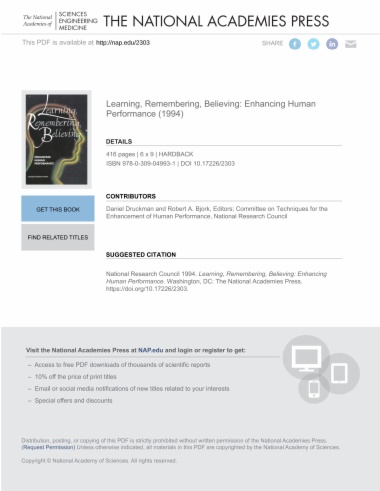Can such techniques as sleep learning and hypnosis improve performance? Do we sometimes confuse familiarity with mastery? Can we learn without making mistakes? These questions apply in the classroom, in the military, and on the assembly line.
Learning, Remembering, Believing addresses these and other key issues in learning and performance. The volume presents leading-edge theories and findings from a wide range of research settings: from pilots learning to fly to children learning about physics by throwing beanbags. Common folklore is explored, and promising research directions are identified. The authors also continue themes from their first two volumes: Enhancing Human Performance (1988) and In the Mind's Eye (1991).
The result is a thorough and readable review of:
- Learning and remembering. The volume evaluates the effects of subjective experience on learning—why we often overestimate what we know, why we may not need a close match between training settings and real-world tasks, and why we experience such phenomena as illusory remembering and unconscious plagiarism.
- Learning and performing in teams. The authors discuss cooperative learning in different age groups and contexts. Current views on team performance are presented, including how team-learning processes can be improved and whether team-building interventions are effective.
- Mental and emotional states. This is a critical review of the evidence that learning is affected by state of mind. Topics include hypnosis, meditation, sleep learning, restricted environmental stimulation, and self-confidence and the self-efficacy theory of learning.
- New directions. The volume looks at two new ideas for improving performance: emotions induced by another person—socially induced affect—and strategies for controlling one's thoughts. The committee also considers factors inherent in organizations—workplaces, educational facilities, and the military—that affect whether and how they implement training programs.
Learning, Remembering, Believing offers an understanding of human learning that will be useful to training specialists, psychologists, educators, managers, and individuals interested in all dimensions of human performance.
- Cover
- Front Matter
- Part I Overview
- Background
- Summary
- Part II Learning and Remembering
- Transfer: Training for Performance
- Illusions of Comprehension, Competence, and Remembering
- Part III Learning and Performing in Teams
- Cooperative Learning
- The Performance and Development of Teams
- Training in Teams
- Part IV Mental and Emotional States
- Self-Confidence and Performance
- Altering States of Consciousness
- Part V New Directions
- Socially Induced Affect
- Thought Suppression
- Epilogue
- References
- Appendices
- A Committee Activities
- B Biographical Sketches
- Index

